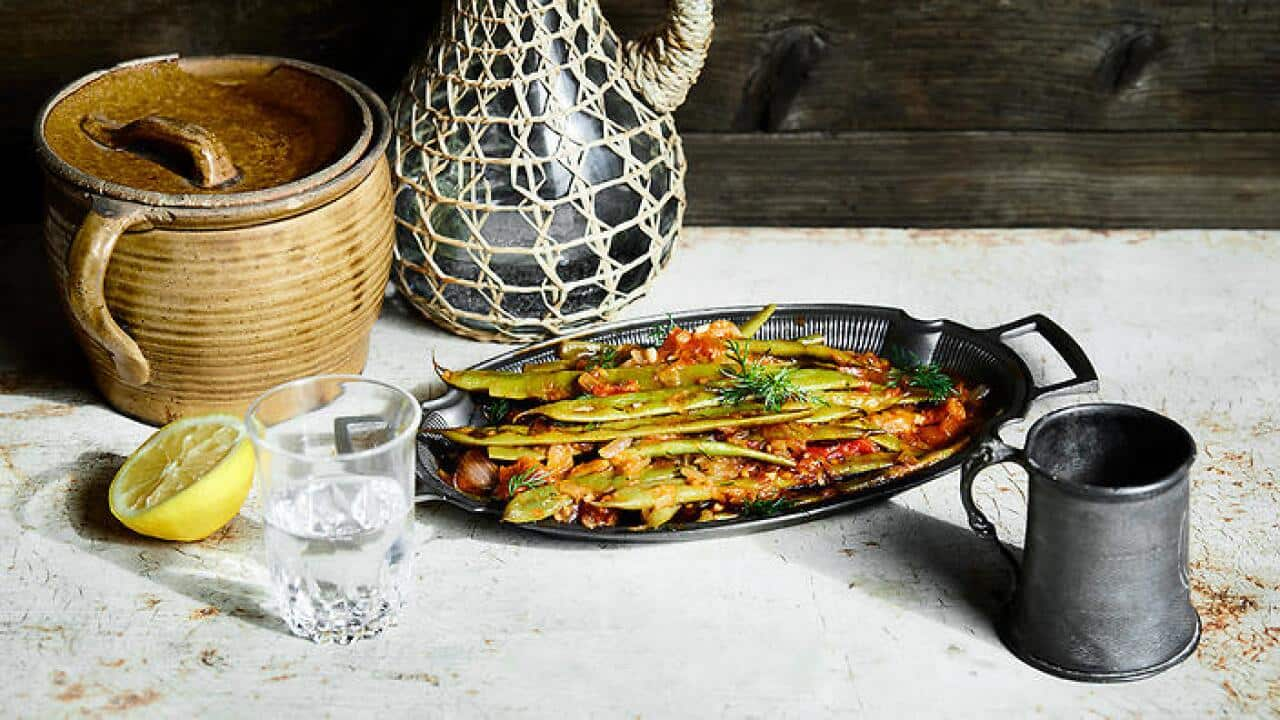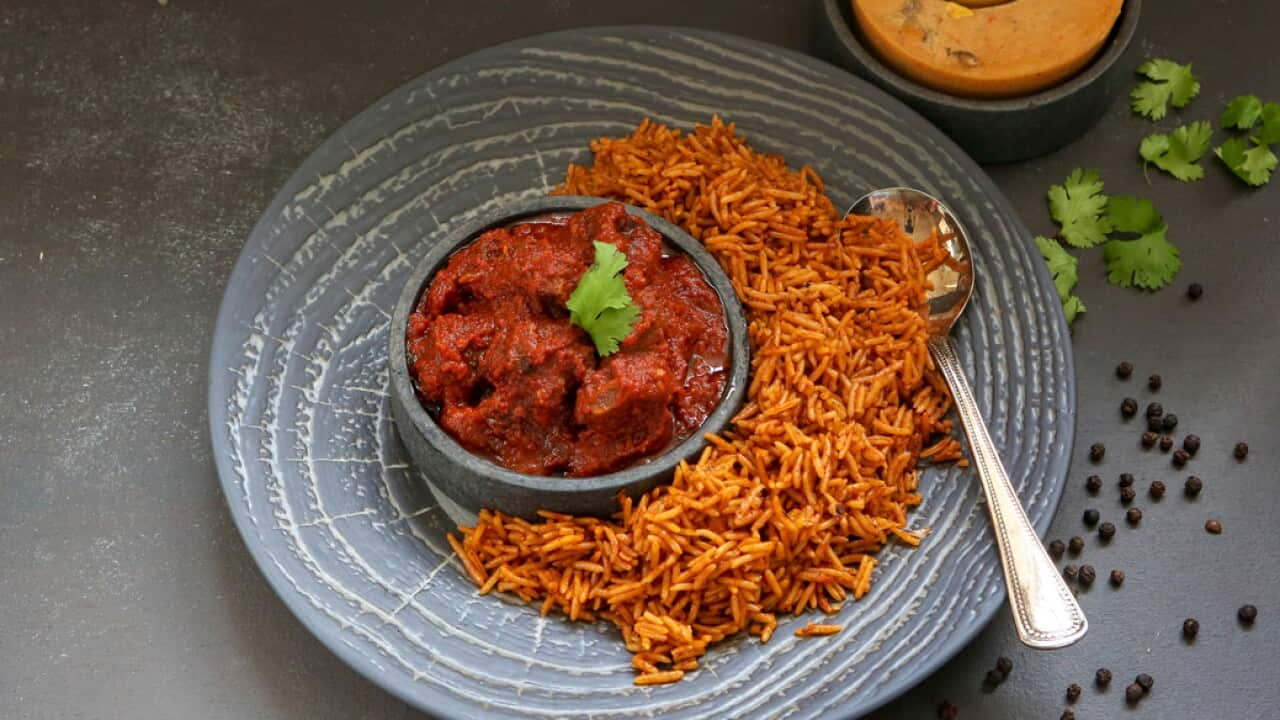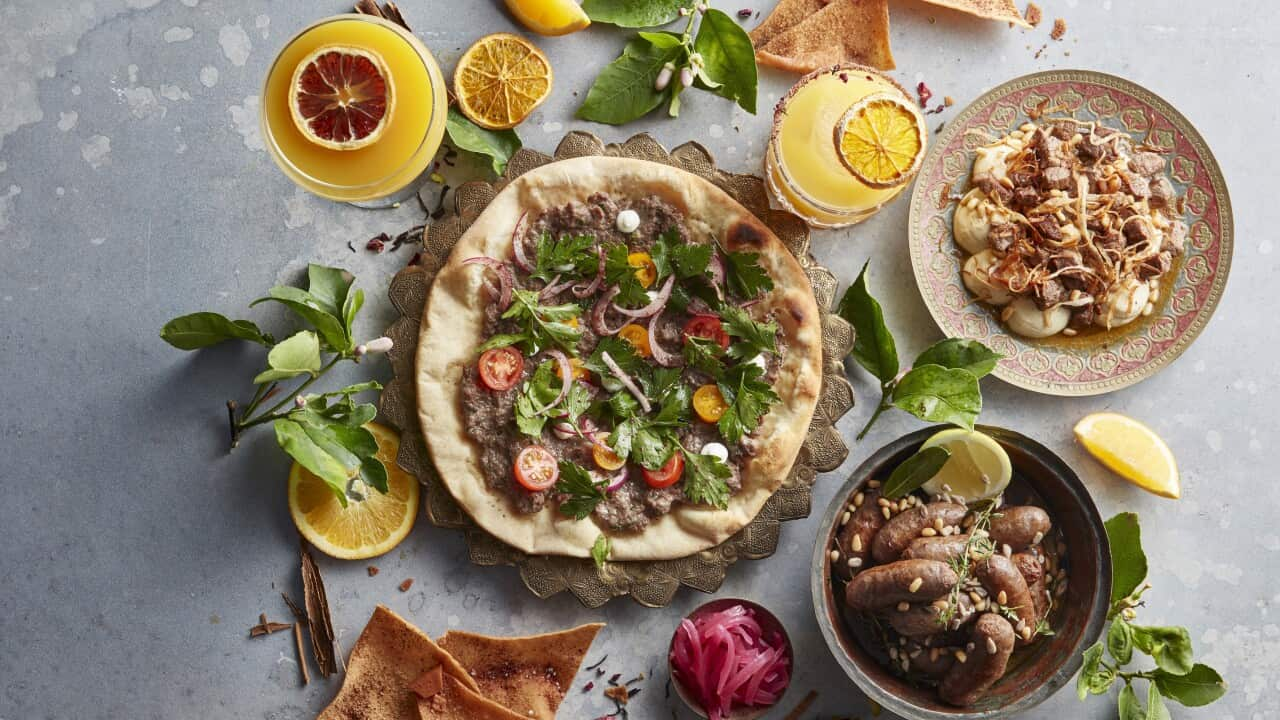When Ibrahim Kasif was growing up, there was a leaf that ruled his house. – a weed used in Cypriot dishes – would literally take over the home.
There were rooms he couldn't even walk into because large volumes of the leaf were being dried there. "We had to help move the stems into the bin, there'd be big branches that'd poke you in the eye," says the chef who now runs Turkish restaurant in Sydney's inner west suburb of Enmore.
To prep the ingredient for cooking, the leaves had to be meticulously separated from the stem – a major production that involved many family members. "They'd come together, put on a Turkish soap opera and they pick leaves for hours on end," he says.
This strong commitment to family cooking was reflected throughout the chef's childhood. His days were spent grating tomato, peeling onions and shredding haloumi ("the national cheese of Cyprus") for pastries. His family always called on him as a culinary back-up. "If they caught me running through the kitchen, it'd be like, 'hey, come here and help!'"
He became an unofficial apprentice to his Turkish-Cypriot grandmother, who came to Australia as a 16-year-old with zero professional cooking experience. She learned through constantly questioning and observing others. Her grandkids tagged along with her to the markets, and when she started buying beans he knew his favourite dish was on the way.
Her (zeytinyağli bakla) were so good that he'd eat it cold, straight from the fridge. He didn't even notice – or complain – that there was zero meat in the dish. "Veggies can be confronting when you're a kid. If you're not conditioned the right way, it can be like 'ugh, vegetables!'" he says. "It wasn't like that in our household, but when you get a dish that's purely vegetarian and you're not even flinching, that says a lot."
"Veggies can be confronting when you're a kid. If you're not conditioned the right way, it can be like 'ugh, vegetables!'" he says. "It wasn't like that in our household, but when you get a dish that's purely vegetarian and you're not even flinching, that says a lot."

Olive oil braised beans with lemon and tomato: Ready to eat. Source: Supplied
The sight of his grandmother peeling tomatoes or prepping beans on the couch meant it was imminent he'd be enjoying zeytinyağli bakla.
The tang of the lemon, the way the beans sucked up the juice of the tomatoes, the punchy smell of the garlic and herbs – it all combined to make this dish his childhood favourite. No wonder he singled it out as a highlight on SBS' .
OLIVE OIL BRAISED BEANS WITH LEMON AND TOMATO (ZEYTINYAĞLI BAKLA) RECIPE
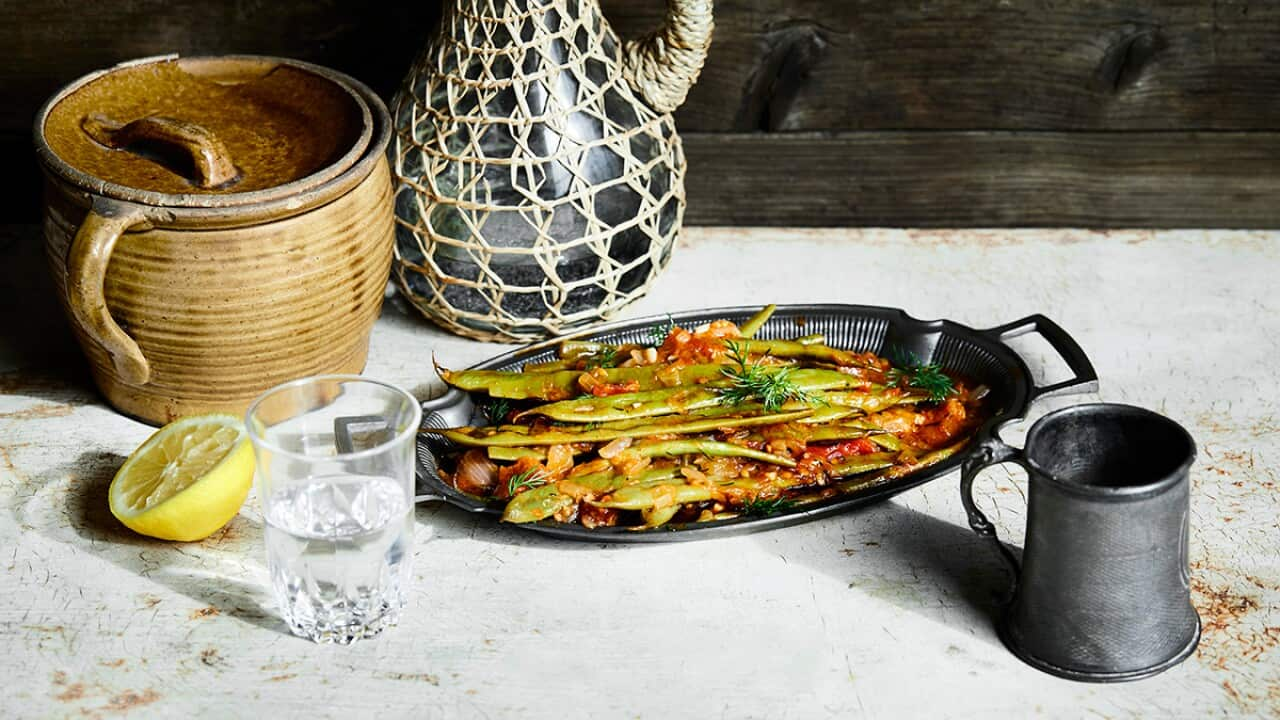
Olive oil braised beans with lemon and tomato (zeytinyağli bakla)
His sister loved it, too. But she preferred the version made with dried beans: this option was more robust and paired well with braised lamb necks. So to keep the kids happy, his grandmother would alternate between the fresh bean and dried bean versions. "We always got excited about finding out which one it'd be," he says.
On , Kasif prepared the recipe with broad beans, but you can easily swap in green beans or flat beans. His sister's preference – for making it with dried legumes – comes with a pantry-friendly advantage: you can prepare this anytime, regardless of what's in season.
The chef explains if you're using white beans you need to cook them in plenty of cold water first.
"Once you get a tender white bean simmered in a good amount of water for 45 minutes to an hour, then you can drain it off and give it the same treatment [with] lots of onion, tomato, garlic."
This version is more robust, so it can take on celery, carrot, bay leaf and other ingredients.
If you're not conditioned the right way, it can be like 'ugh, vegetables!' It wasn't like that in our household, but when you get a dish that's purely vegetarian and you're not even flinching, that says a lot.
Kasif admits he was "never a fan" of this style. "It wasn't until I had my mother-in-law's version a few years ago that it really ramped up my love for the braised dried beans," he says.
"I feel like my mother would be really offended! But it's true." Instead of the tomato-heavy and oil-rich style he was used to, his mother-in-law created a much lighter recipe. He was so impressed, he instantly put it on Stanbuli's menu. When Kasif first started cooking professionally, he was swept in by the hype around Western food: he served beans crunchy and fresh, like the French do, not with the tangy, tomato-rich braise he was used to.
When Kasif first started cooking professionally, he was swept in by the hype around Western food: he served beans crunchy and fresh, like the French do, not with the tangy, tomato-rich braise he was used to.

Preparing these beans for a meal even people who avoid veggies will want to eat. Source: Supplied
But Stanbuli represents his reconnection to the food he grew up with and his realisation that there's exceptional skill in hand-stretching a few grams of dough into phyllo or making Turkish dumplings inspired by the Chinese border – all skills his grandmother learnt by necessity, as a teenager. And while eating through Turkey's south, he realised her dishes (like the braised beans) trumped what restaurants served.
Fellow chefs also started showing interest in his cultural background. "That's what you should be excited about, your mother's cooking and your grandmother’s cooking!" they told him.
And he realised they were right. "That's what I should be excited about."
Olive oil braised beans with lemon and tomato (zeytinyağli bakla)
Ingredients
- 3 kg baby broad beans in the pod (or use flat or round beans), washed
- 5 vine-ripened tomatoes, blanched, peeled and roughly chopped
- 20 g sugar
- 200 ml lemon juice
- 200 ml extra virgin olive oil
- salt and freshly ground black pepper
- 4 large onions, diced
- 6 garlic cloves, finely diced
- 1 bunch parsley, washed and roughly chopped
- 1 bunch dill, roughly chopped
1. To prepare the beans, starting from the top of the beans, run a small sharp knife down both sides to remove the strings, but keep the beans in-tact.
2. Place the diced tomatoes in a bowl with the sugar, lemon juice and half the oil. Add a pinch each of salt and pepper and stir to combine. Set aside.
3. Heat the remaining oil in a large heavy-based saucepan over medium-high heat. Add the onion and a pinch of salt and cook for 5-6 minutes or until soft and translucent. Add the garlic and stir for 30 seconds or until fragrant. Add the macerated tomatoes and cook, stirring continuously for 10 minutes – you’re looking for a split, oily sauce.
4. Add the beans to the tomato mixture with a touch more salt and cook for another 20 minutes. Add enough water to just cover and simmer, uncovered for 25-30 minutes or until tender.
5. Add the parsley and cook for another 5 minutes, then remove from the heat.
6. Allow to cool in the pan for 15 minutes, then stir in the chopped dill and more lemon juice and salt if needed. Serve.
IT REALLY DOES FEEL LIKE HOME
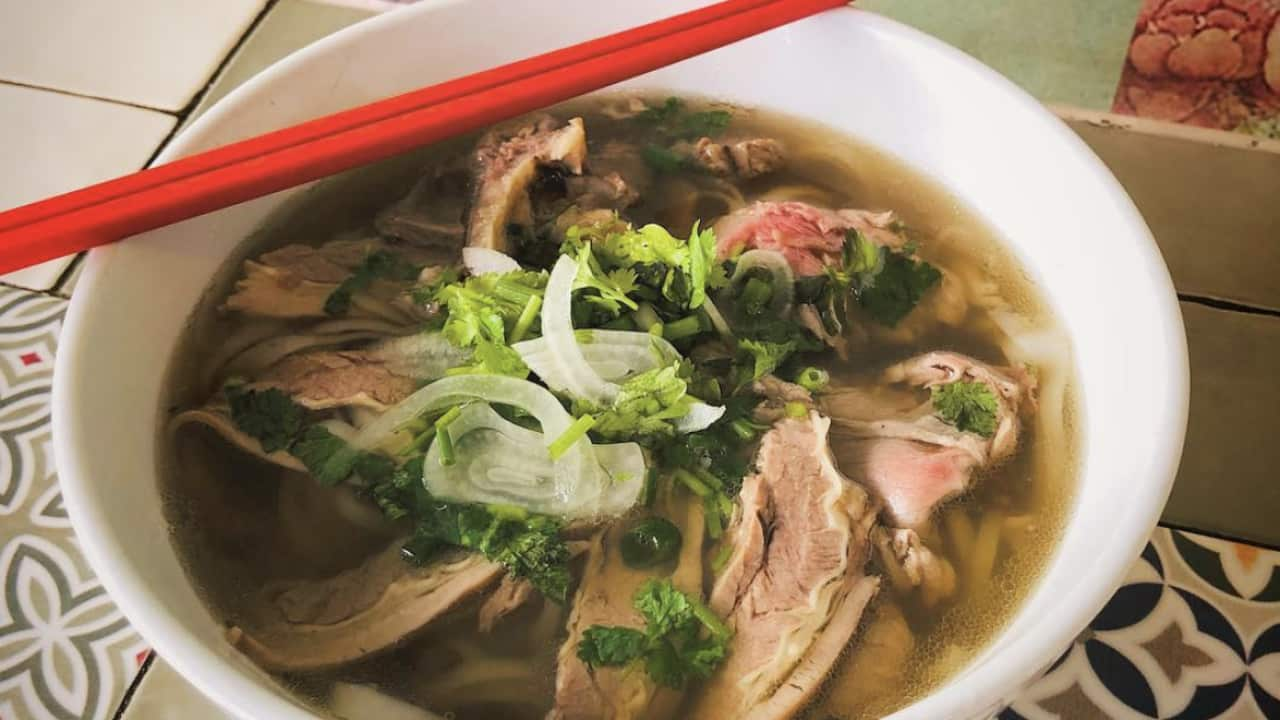
Feels like home: 'Pho made my grandma's dream come true'

